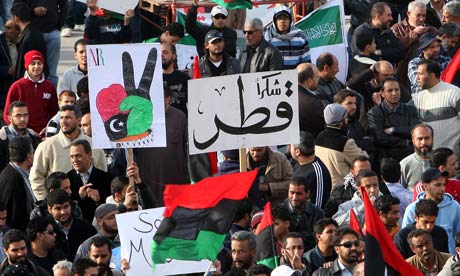It's starting, the bigger tribes start talking, thanks CAM:
Libya's biggest tribe joins march of reconciliation to Benghazi
Members of Warfalla deny plan to join civilians in carrying olive branches through war zone is a propaganda stunt

Bani Walid looks like any Libyan town with its breezeblock houses, unpaved streets and giant posters of Muammar Gaddafi. But it is famous for resisting Italian colonialism and as the centre of the country's biggest tribe, which is now anxious to be seen as a loyal pillar of the regime.
With more than a million members, Warfalla live all over Libya, including in the rebel stronghold of Benghazi. The tribe's geographical distribution means it is well-placed to help heal bitter divisions by joining a peaceful "green march" to the eastern city to promote reconciliation and avoid the Korea-style partition of the country many fear.
It is also highly likely that this innocent-sounding mass movement – involving large numbers of civilians carrying olive branches through a war zone – is a government-inspired propaganda stunt intended to complicate military operations by the coalition and the rebels.
But Salman al-Dagil insists it is not. "We will talk to them, not use guns, to discuss their demands," said the Bani Walid doctor.
"Some are youths who want things but have been exploited. Do they want to divide the country? No, we will not agree to that. Do they want a constitution? The majority must agree. No one wants to replace Muammar Gaddafi. But the problem is a conspiracy against Libya."
Locals insist that no significant Warfalla figure is involved in the opposition despite early claims that the entire tribe had defected. There has been talk of large cash payments to ensure they did not – or changed sides again.
According to rumours in Tripoli, key tribes have been offered large sums of money to ensure that they toe the line at this time of unprecedented danger to the regime. Tribal leaders can be seen in their finery in the capital's best hotel and being driven around in the sleek government vehicles reserved for VIPs.
In Bani Walid allegiances are certainly fiercely displayed, with pro-regime slogans and much waving – and noisy firing – of the machine guns that have been distributed to the people in recent days.
Tribal elders in traditional black felt caps, white robes and gold-brocaded waistcoats are mourning a Bani Walid soldier, Fathi Issa Boubakr, killed in Benghazi by a rocket fired by a French jet four days ago.
The sign above a mourning tent set up on a patch of withered grass in the centre of town records that Fathi, 29, was "martyred fighting the crusader aggression and defending the Arab nation and Islam". He left a wife and two children, their picture displayed by relatives. Tribes are a key element of the country's social fabric.
"All Libyans are related, especially the Warfalla," said Mbrak Ibrahim, a British-educated telecoms engineer. "It means that we have family everywhere. We will be happy if we can open our hearts and stop this bloodshed."
The tribes are also politically important. Gaddafi's tribe, the Gadadfa, is allied with the far larger Megarha, whose stronghold is in Sebha on the edge of the Sahara. Its members dominate the air force and other security branches. The Tarhuna, another large western tribe, has reaffirmed its support for the regime after an apparent wobble last month.
It is ironic that a revolution that began in 1969 under the banner of progressive Arab nationalism that would eradicate reactionary social divisions has become so dependent on using them to maintain control. Gaddafi tried at first to suppress the tribes but later co-opted them and established a tribal-based "People's Social Leadership Committee".
Not everyone approves of the official emphasis on tribal origins and allegiances. "My wife is from the Warfalla," said Hussein, a journalist from Sirte, Gaddafi's home town. "But I don't like these tribal labels at all. I am a Libyan, and a Muslim. If you ask me what tribe I am from it's as if I ask you how much you earn."
It seems unlikely the Warfallla and other tribes can simply head east and end this war, whether or not it is merely a diversionary tactic. "If the west leaves us alone we can solve Libya's problems," said Dagil. "I will march peacefully. My own sister is in Benghazi. She has four children. I am not going to kill her."
It's not the biggest tribe, but the second biggest.
ReplyDeleteBut what's more important they are the biggest Eastern tribe.
Hey, 3 stooges, EASTERN TRIBE, rings a bell?
@hermes
ReplyDeleteanother quote from the Telegraph today.
'British defence chiefs admit they are struggling to understant the rebel groups'." We are trying to understand what they want and what they are doing" said a military planner in the ministry of defence. "There's no cohesion and there are factions from Benghazi to Misurata and those in Benghazi are not necessarily the right people to talk to. I think stalemate is a definite possibility."
CAM
@ CAM
ReplyDeleteLet me try to understand:
We help one minority armed group of rebels by bombing the majority section of the population and afterwards we want to know who the hell we are helping?
It's a mad, mad, mad world and the 3 stooges are criminals.
@hermes
ReplyDeleteSarkozy is reportedly suffering from a mental illness.
The British have a tendency to make bad decisions on foreign issues, after the empire and second world war etc. Allocating land in ways that later caused problems not understanding local dynamics.
Dr Watt's blog ( westimsterscheatingus) states the UK gov is acting in contravention of its own anti terrorist laws. CAM